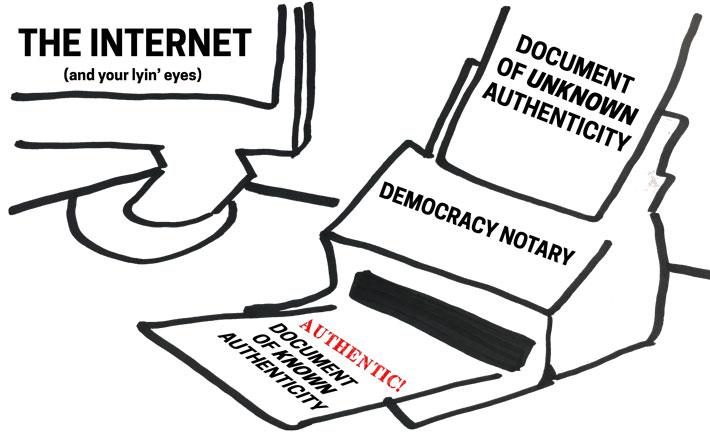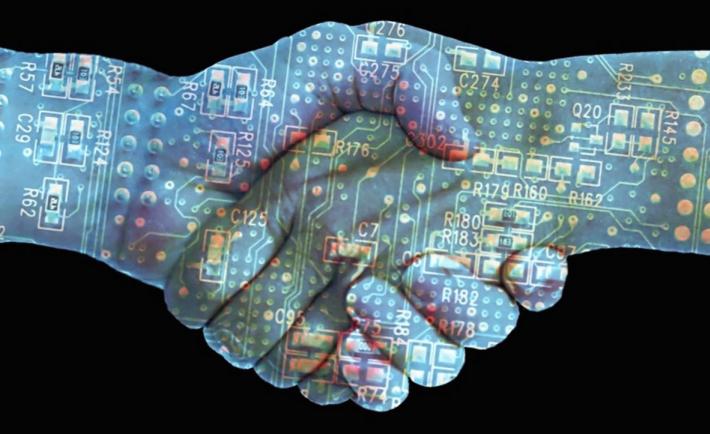“Who you gonna believe” – as the comics say – “me, or your lyin’ eyes?” When it comes to politics, cognitive bias has always given citizens a strong push to believe “their side,” whatever the evidence to the contrary suggests. As disinformation swamps the internet, the problem has become much worse with lyin’ evidence that’s all too easy to believe. Increasingly, information is forged or manipulated. Convincing but fake, this disinformation fuels hyper-partisan hatred, bolsters conspiracy theories and undermines critical democratic institutions. But identifying disinformation is only one piece of the puzzle. What we need is a way to stop forged information entirely; a way to prove that content is original and legitimate.
Sorting Truth from Truthiness in the Digital Age
Can blockchain help rebuild trust in democracy?

Rachel Pipan, Allison Price, Tomicah Tilleman and Chris Doten (far right) in on-stage selfie right before their South by Southwest panel “Trust Crisis: The Need for Blockchain.”
Don’t get lost in the technobabble – blockchain is a confusing technology with a simple purpose: enabling groups that don’t trust each other to trade things or validate information without an all-powerful middleman. In a world where trust in institutions, including government, is declining, blockchain provides a useful way to create new systems to empower groups to work together and define what truth is. The blockchain is not synonymous with cryptocurrency, but it is related to cryptocurrency in the same way that the first application of the internet was email.
Blockchain and the Public Trust
_1_0_0_0_0_0.jpg)
Attendees at the 2017 Blockchain Summit. From left to right as Heidi Pease from UCLA Blockchain Lab; Saadia Madsbjerg from Rockefeller (in front); Roya Mahboob (mic); Stela Mocan of World Bank.
In late July, a broad range of technology, business, philanthropy and policy leaders from around the world gathered at the third annual Blockchain Summit. This was no ordinary technology conference. First, nearly half the attendees were women; and second, the discussion centered less on technology and more on practical ways these new blockchain-based technology tools can be used for the public good.
Simply put, “blockchain” is a type of database used to store and keep public records. Changes to any records are automatically and permanently tracked and identical copies are stored in multiple locations. It is often described as a decentralized and distributed bookkeeping or ledger system designed to be a more secure and efficient way to transfer digital information.
Today, blockchain is best known as the technology underlying Bitcoin and other digital currencies. But the July gathering was devoted to exploring other non-financial industry uses where blockchain’s secure and verified digital record keeping also might prove valuable.
What the blockchain could mean for democracy in the digital age
On Monday, the National Democratic Institute (NDI) joined the Bitfury Group and New America to launch the Blockchain Trust Accelerator, which will work to connect governments with the technologists and resources needed to pilot blockchain applications aimed at enhancing good governance. The blockchain -- which is, briefly put, an incorruptible and public ledger made up of data that is stored decentrally, entirely distributed and interconnected -- is most well known for being the underlying software that was invented to enable the Bitcoin digital currency. While the future of the blockchain is still being written, it’s possible the primary uses will not even be for currency or financial technology.


